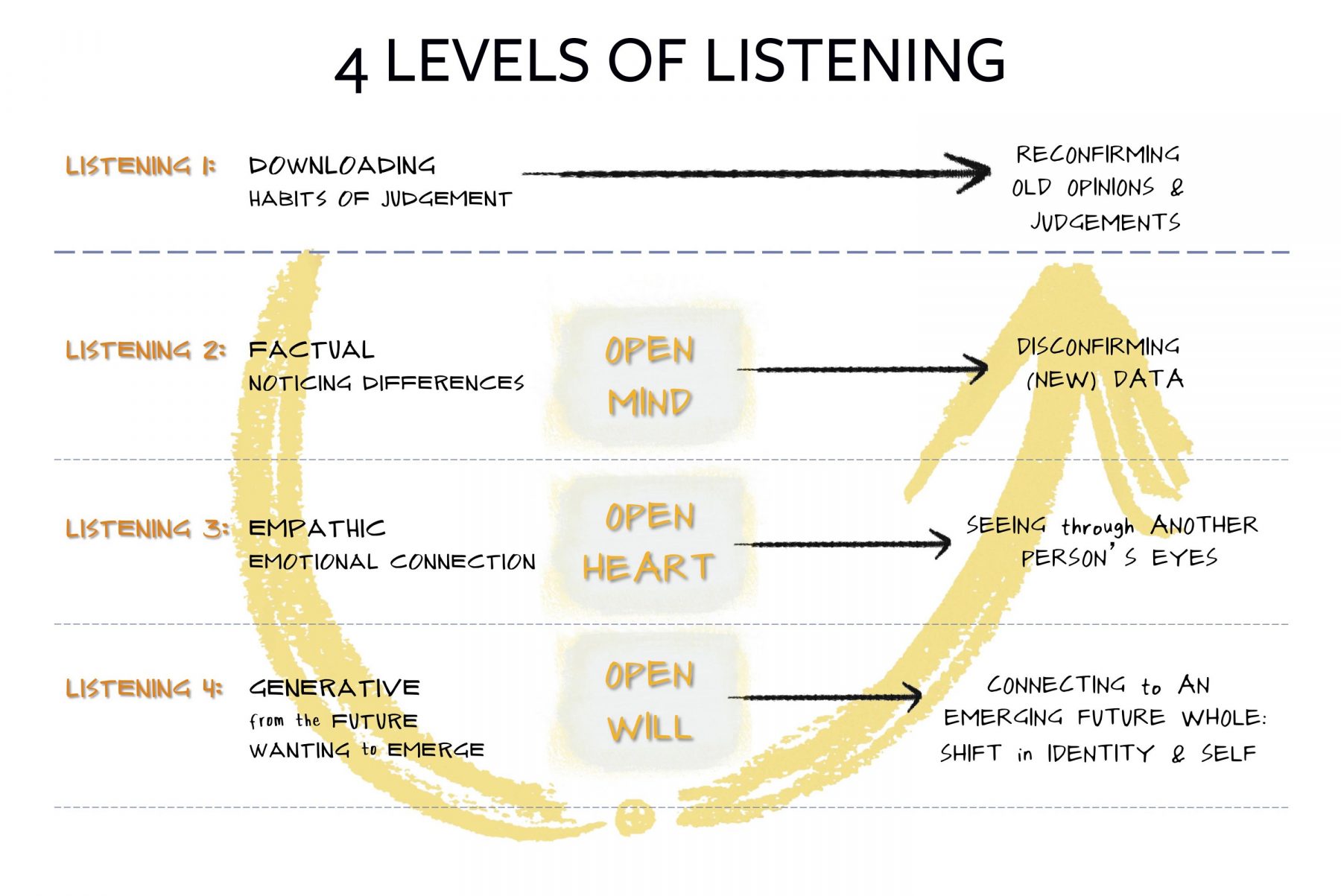Otto Scharmer writes:
“Over more than a decade of observing people’s interactions in organizations, I have noted four different types of listening.”
Listening 1: Downloading
“Yeah, I know that already.” I call this type of listening “downloading”—listening by reconfirming habitual judgments. When you are in a situation where everything that happens confirms what you already know, you are listening by downloading.
Listening 2: Factual
“Ooh, look at that!” This type of listening is factual or object-focused: listening by paying attention to facts and to new or disconfirming data. You switch off your inner voice of judgment and listen to the voices right in front of you. You focus on what differs from what you already know. Factual listening is the basic mode of good science. You let the data talk to you. You ask questions, and you pay careful attention to the responses you get.
Listening 3: Empathic
“Oh, yes, I know exactly how you feel.” This deeper level of listening is empathic listening. When we are engaged in real dialogue and paying careful attention, we can become aware of a profound shift in the place from which our listening originates. We move from staring at the objective world of things, figures, and facts (the “it-world”) to listening to the story of a living and evolving self (the “you-world”). Sometimes, when we say “I know how you feel,” our emphasis is on a kind of mental or abstract knowing. But to really feel how another feels, we have to have an open heart. Only an open heart gives us the empathic capacity to connect directly with another person from within. When that happens, we feel a profound switch as we enter a new territory in the relationship; we forget about our own agenda and begin to see how the world appears through someone else’s eyes.
Listening 4: Generative
“I can’t express what I experience in words. My whole being has slowed down. I feel more quiet and present and more my real self. I am connected to something larger than myself.” This type of listening moves beyond the current field and connects us to an even deeper realm of emergence. I call this level of listening “generative listening,” or listening from the emerging field of future possibility. This level of listening requires us to access not only our open heart, but also our open will—our capacity to connect to the highest future possibility that can emerge. We no longer look for something outside. We no longer empathize with someone in front of us. We are in an altered state. “Communion” or “grace” is maybe the word that comes closest to the texture of this experience.

When you operate from Listening 1 (down-loading), the conversation reconfirms what you already knew. You reconfirm your habits of thought: “There he goes again!”
When you operate from Listening 2 (factual listening), you disconfirm what you already know and notice what is new out there: “Boy, this looks so different today!”
When you choose to operate from Listening 3 (empathic listening), your perspective is redirected to seeing the situation through the eyes of another: “Boy, yes, now I really understand how you feel about it. I can sense it now too.”
And finally, when you choose to operate from Listening 4 (generative listening), you realize that by the end of the conversation you are no longer the same person you were when it began. You have gone through a subtle but profound change that has connected you to a deeper source of knowing, including the knowledge of your best future possibility and self.
From: ‘Addressing the Blind Spot of Our Time’ – an executive summary of the new book by Otto Scharmer Theory U: Leading from the Future as It Emerges (Cambridge, 2007).



